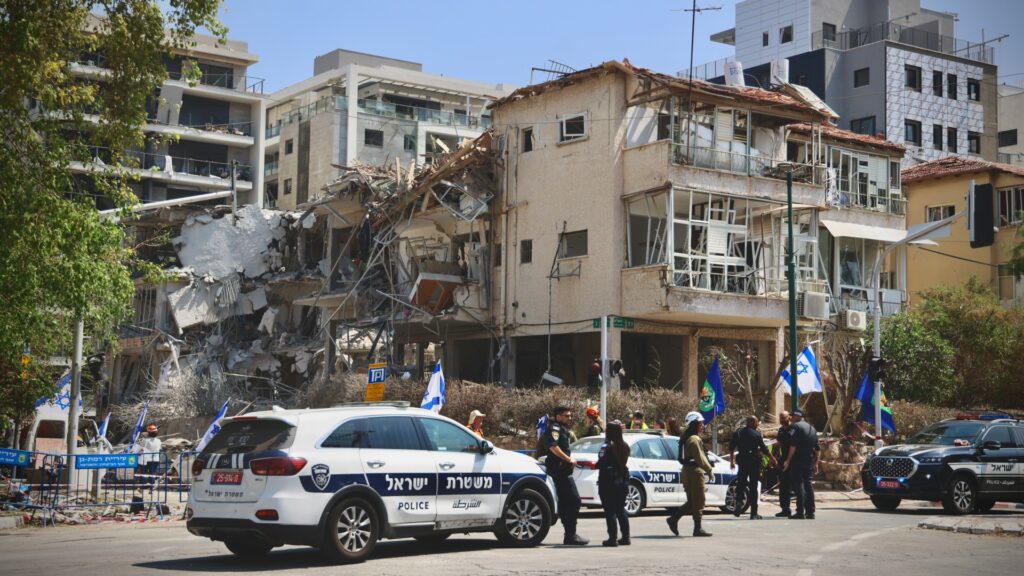Israelis said the initial euphoria over the shock attacks on Iran has given way to fear, after Iranian missiles slammed into central Tel Aviv and other parts of Israel, causing widespread destruction and killing at least three people.
Bright orange flashes illuminated the sky over Tel Aviv early on Saturday as Israeli air defence systems appeared to down some of the incoming missiles.
Still, fires and plumes of smoke could be seen in several areas of Tel Aviv, while explosions were also reported in Jerusalem.
Images and videos verified by Middle East Eye showed apartment blocks in Tel Aviv’s suburbs and the nearby city of Ramat Gan almost completely destroyed and the wreckage of several vehicles among the debris.
Emergency services reported early on Saturday that at least three people were killed across Israel and more than 40 were injured.
New MEE newsletter: Jerusalem Dispatch
Sign up to get the latest insights and analysis on
Israel-Palestine, alongside Turkey Unpacked and other MEE newsletters
More than 200 Israelis are reported to have been wounded since Friday.
“The night was very scary,” Meron Rappaport, a Tel Aviv resident, told MEE.
“There was complete euphoria over how we eliminated the Iranian leadership… but it’s clear to me that after a night like last night, people are in shock.
“There’s no one on the street. And if it continues like this, I don’t see anyone going to work.”
Early on Friday, Israel launched a flurry of attacks on sites across Iran, including its nuclear facilities, and killed several commanders in their residences – among them the head of the Islamic Revolutionary Guard Corps (IRGC).
Pushing the region into a new conflict with uncertain consequences, Israel continued its attacks across Iran for much of Friday, resulting in Iran firing hundreds of ballistic missiles towards Israel, in what the Islamic Republic called the beginning of its “crushing response”.
Following the strikes, Iranian Supreme Leader Ali Khamenei said Israel’s deadly attacks would “bring it to ruin”.
“The armed forces of the Islamic Republic will inflict heavy blows upon this malevolent enemy,” Khamenei said in a televised speech.

Whether with a green light or grudging acceptance, Trump enters war with Iran
Read More »
Orly Yafa-Niger, a 67-year-old Israeli living in central Israel, told MEE that after initially supporting the strikes against Iran, reality quickly hit home that Israel was vulnerable and that Israelis, just like Iranians, could also be targeted.
“The attack surprised me,” Yafa-Niger said.
“We were sitting in a dorm when we heard a loud boom, and we began to wonder what it was and what it hit.
“Then we realised that it hit a building, destroyed homes. We realised that it’s happening here and it’s real and close. Suddenly, you accept that what’s happening in Iran can happen here, too.”
She added that the warning sirens, which sent millions of people rushing for safe rooms and bomb shelters, had triggered palpable fear among every Israeli.
“Our reality has changed,” she said.
“There are alarms and notifications, alerts to raise awareness that something is about to happen, which increases stress and uncertainty over what is going to happen. This raises anxiety.”
‘Disturbed fantasy’
Speaking to reporters on Saturday, Israeli Defence Minister Israel Katz warned that “Tehran will burn” if the Islamic Republic continued responding to Israeli attacks by firing missiles at Israel.
“If Khamenei continues to fire missiles at the Israeli home front, Tehran will burn,” he said.
Despite the threatening language, several Israeli hospitals began relocating patients underground on Saturday, bracing for further retaliatory Iranian strikes.

The more Israel kills, the more the West portrays it as a victim
Read More »
Patients at the Sheba Medical Center, in the Tel Aviv area, were seen in video footage being transported to fortified underground facilities. Other footage showed staff transferring equipment and other essential medical gear.
Orly Noy, a Jerusalem-based journalist, told MEE that Iran’s attacks had shattered the myth that Israeli leaders had often repeated to the Israeli public: that they were immune to any and all reprisal attacks.
“The Israeli public has been convinced over the years that it can exist here in the region while deeply disdaining all its neighbours and rampaging in a thuggish and murderous manner against everyone – whenever and however it wants – relying solely on brute force.
“That’s why there was something so substantial about the sight of the bombed-out buildings in Ramat Gan,” he said.
“They are so similar to the images we’re used to seeing from Gaza. Those sooty grey skeletons of buildings, that billowing cloud of dust, that carpet of ash and rubble covering the street, those images of children’s dolls in the hands of rescue teams.
“The scale is, of course, completely different, but these images are nevertheless a momentary rupture of this disturbed fantasy that we are immune to everything,” he added.
In a televised address on Friday, Israeli Prime Minister Benjamin Netanyahu vowed to continue attacking Iran for “as long as necessary” and also urged Iranians to rise up against their leaders.
But Yafa-Niger said that Netanyahu’s combative relationship with regional states would either lead to his downfall or result in Israelis leaving the country en masse.
“I have a very hard time with this messianic government, a government that is very extreme and not at all being run correctly,” she said.
“I’m also very worried about what will happen the day after and what will everything look like here if this government continues to rule.
“If there is no political change here, it will be very difficult for me here, very difficult.”



